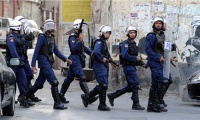Home » Bahrain » Press Releases » BHR - News » Bahrain: Student Detained Incommunicado for 20 Days at High Risk of Torture
The student was arrested in his house by masked members of the Security Forces, which are under the control of the Ministry of Interior, who did not presented a warrant or explained the reasons for Ali's detention. Shortly after his arrest, the 21-year-old was allowed to make a short phone call to his family to inform them of his place of detention. After that brief call, Ali was not allowed to contact his family or a lawyer. He remains detained incommunicado without charges and without knowing the reasons for his detention.
According to a joint study prepared by the WGAD together with other UN experts, "prolonged incommunicado detention may facilitate the perpetration of torture and other cruel, inhuman or degrading treatment or punishment and can in itself constitute such treatment." Ali's situation is particularly worrying as, in Bahrain, detainees held incommunicado are frequently tortured by detaining authorities with the goal of extracting confessions, as documented by Alkarama on 15 December 2015, 20 November 2015, 13 November 2015 and again on 13 November 2015. "We are extremely concerned over yet another case of incommunicado detention in Bahrain," says Radidja Nemar, Legal Officer for the Gulf in Alkarama. "Every day that Ali remains detained incommunicado, he faces a greater risk of being tortured."
Prevented from communicating with Ali or appointing a lawyer to deal with his case, the student's family turned to Alkarama, which in turn seized the UN Working Group on Arbitrary Detention (WGAD), in the hope that this UN Special Procedure on the protection and promotion of human rights could help release Ali through an urgent intervention with the Bahraini authorities. As a State party to the International Covenant on Civil and Political Rights (ICCPR) and the Convention against Torture (UNCAT) and its Optional Protocol (OPCAT), Bahrain must put an end to the practice of torture and ensure that allegations of torture are the object of impartial and independent investigations.
For more information or an interview, please contact the media team at This email address is being protected from spambots. You need JavaScript enabled to view it. (Dir: +41 22 734 1008)
 Algeria
Algeria Bahrain
Bahrain Djibouti
Djibouti Egypt
Egypt Iraq
Iraq Palestine/Israel
Palestine/Israel Jordan
Jordan Kuwait
Kuwait Lebanon
Lebanon Libya
Libya Mauritania
Mauritania Morocco
Morocco Oman
Oman Qatar
Qatar Saudi Arabia
Saudi Arabia Sudan
Sudan Syria
Syria Tunisia
Tunisia United Arab Emirates
United Arab Emirates Yemen
Yemen Other Countries
Other Countries






